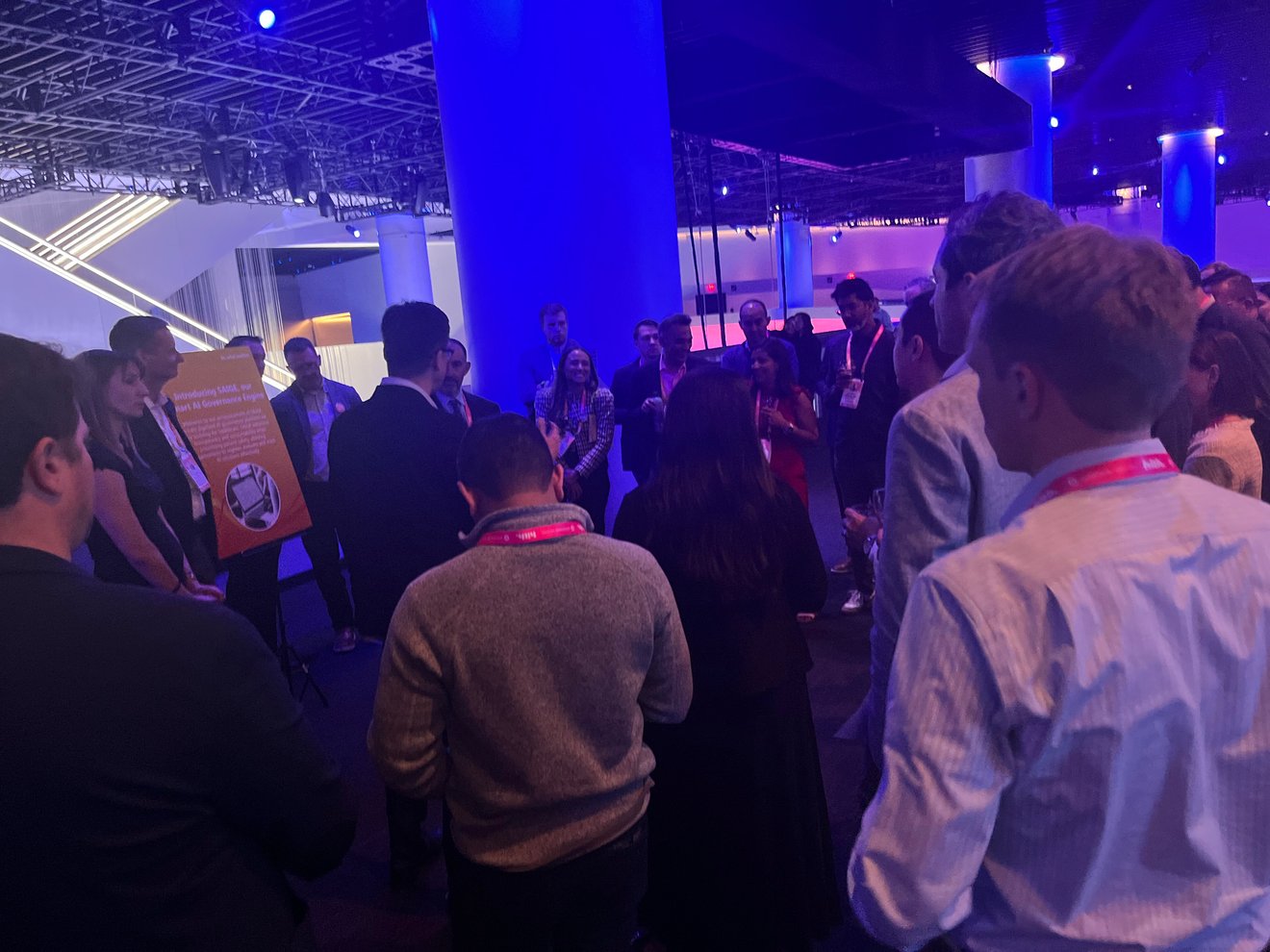seen and heard
Will "responsible AI" spawn a new market for tech?
This year's gathering features HLTH's signature opulence and spectacle: as usual, a hair salon for attendees, an indoor puppy park, and a vast exhibit floor crammed with flashy booths, giveaways and high-tech demos. I narrowly dodged the below quadruped as it roamed the showroom; still unclear to me if it had anything to do with health.

Between high-profile panels and offline hallway conversations, chatter seems to be concentrated on a few themes: GLP-1s, the wildly popular weight loss drugs, and their potential to make Americans healthier; AI co-pilots for every role in health care; and guardrails (or lack thereof) for cutting-edge tech in medicine.
I also visited the Las Vegas Sphere where Avanade — a joint venture by Microsoft and Accenture — announced a new tech product aimed at governance, transparency, and regulatory compliance. Built in collaboration with Duke and Microsoft, the "Smart AI Governance Engine" lets users register algorithms, track their performance and evaluate bias, among other functions, founders said during a somewhat haphazard launch panel in a Sphere hallway followed by a streamed U2 concert. (The latter's visuals, I admit, were impressive.)

Among speakers were Michael Pencina, Duke Health's chief data scientist, David Rhew, Microsoft's global chief medical officer, and Avanade managing director Lee Ayling.

Founders said they chose to unveil the product at HLTH because of its reputation as a gathering of forward thinkers and decision makers. The Sphere — in line with HLTH's glitzy branding — "was selected as another marvel in AI and technology and a perfect background for the launch," Ayling said in a statement.
Asked how the technology might integrate with electronic medical records, Ayling said the team was aware that EHRs operate in a more heavily regulated environment and the "use of AI within a clinical environment does not as yet," and that it was "seeking vendors to input into the platform information of their own AI algorithms – some of these will be EHRs."
The Smart AI Governance Engine, or SAIGE, is expected to hit the market in December — the first wave of users will be health care providers, hospitals and health systems. Avanade said pricing information will be released after the roll-out.
FDA's Califf: AI is increasing health inequities
On stage at HLTH, Food and Drug Administration Commissioner Robert Califf, a cardiologist and long-time policy veteran who also served a stint at Alphabet's Verily, said he was disappointed that more buzzy tech products weren't focused on primary care, especially given the U.S.'s inferior health track record compared to other countries. "I see a lot of the glitz at a meeting like this," he said. "Our fundamental problem is sort of blocking and tackling. It's like we're trying to throw the touchdown, but we're not even doing the basic blocking and tackling. Primary care in this country is a disaster."
Instead of focusing on problems afflicting healthy patients with financial means, tech companies should be "turned loose on assisting basic fundamental health care," like ensuring patients are up-to-date on vaccines or managing their blood pressure, he said.
AI could also be exacerbating health inequities, Califf said. "I feel like right now it's furthering the divide" between marginalized patients and their wealthier, healthier counterparts, he said. Instead, it could be used to augment doctors and nurses, assisting their note-taking and filing, so they can focus more on bedside care, he added. As a key AI regulator — the FDA houses software-as-a-medical device oversight, for instance — Califf echoed the Health and Human Services Department' top AI official Micky Tripathi's previous calls for public-private collaboration.
"We have laws rules and guidances. We're sort of a referee in the system, but the first line of defense is the industry doing what they're supposed to do in the first place," he said. "In the AI world we need the health systems and the industry developing the AI ..make sure the life cycle of algorithm is properly conducted," he said. If FDA were responsible for all of it, he said, "we'd be an FDA 2 or 3 times bigger than it currently is." The agency employs about 18,000 people and has an annual budget of about $7.2 billion.
Product launch roster: Noom, Oura and Amazon
It's nearly impossible to keep up with all the product launches timed specifically for HLTH, but here's some news we're tracking:
- Telehealth companies have had to contort themselves to fit the debate over the utility, cost, and accessibility of the blockbuster obesity and diabetes drugs known as GLP-1s, Katie Palmer writes. Shortages and limited insurance coverage of the FDA-approved meds spawned two strategies: Payer-focused programs that promise to maximize the impact of the pricey branded drugs, and direct-to-consumer sales of compounded copies of the drugs. Now, Noom is mashing them up. The company known for its weight loss app announced a new program for employers that don't want to pony up for GLP-1 coverage: Lifestyle and behavioral support through Noom, combined with cash pay options (and potential discounts) for its recently-launched compounded drugs. Another benefit program in collaboration with Waltz Health combines clinical support from Noom Med for branded, FDA-approved GLP-1s.
- Some Essence Healthcare Medicare Advantage members will soon be eligible for a free Oura Ring and membership.
- Amazon One Medical unveiled some new AI tools designed to ease health care providers' administrative workflow, including by automatically summarizing patients' medical history.
- The Coalition for Health AI released some draft frameworks for certifying AI assurance labs, its concept for a federated network of health institutions evaluating AI and standard health AI "nutrition labels."


No comments